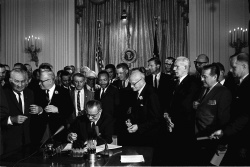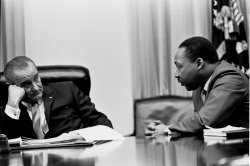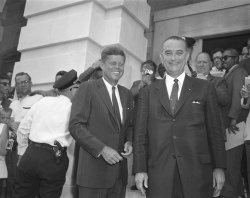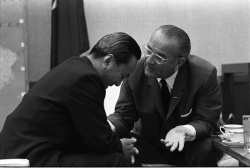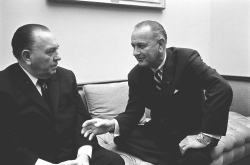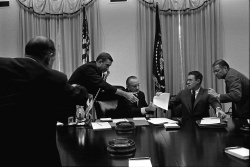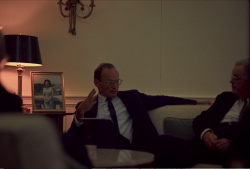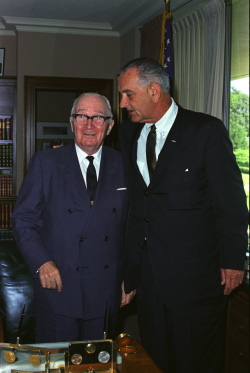1st2nd3rd4th5th6th7th8th9th10th11th12th13th14th15th16th17th18th19th20th21st22nd23rd24th25th26th27th28th29th30th31st
July 1st
On this day in 1968, President Johnson signed the Nuclear Non-Proliferation Treaty with 58 other countries in efforts to prevent the spread of nuclear weapons.
“After nearly a quarter century of danger and fear—reason and sanity have prevailed to reduce the danger and to greatly lessen the fear. Thus, all mankind is reassured.
“As the moment is reassuring, so it is, even more, hopeful and heartening. For this treaty is evidence that amid the tensions, the strife, the struggle, and the sorrow of these years, men of many nations have not lost the way—or have not lost the will—toward peace. The conclusion of this treaty encourages the hope that other steps may be taken toward a peaceful world.
“It is for these reasons—and in this perspective-that I have described this treaty as the most important international agreement since the beginning of the nuclear age.
“It enhances the security of all nations by significantly reducing the danger of nuclear war among nations.
“It encourages the peaceful use of nuclear energy by assuring safeguards against its destructive use.
“But, perhaps most significantly, the signing of this treaty keeps alive and keeps active the impulse toward a safer world.”
July 2nd
On this day in 1964, President Johnson signed the Civil Rights Act of 1964 outlawing discrimination based on race, color, national origin, religion, or sex in public accommodations such as hotels, theaters, parks, restaurants, and other public places. The act also authorized the withdrawal of Federal funds from programs that practice discrimination. It discouraged job discrimination through the creation of the Equal Employment Opportunity Commission. It also authorized the Attorney General to bring lawsuits against schools practicing segregation, and made the Commission on Civil Rights a permanent organization.
On this day in 1964, President Johnson had a telephone conversation with civil rights leader Roy Wilkins.
The President asked for Wilkins’ advice on when to sign the Civil Rights Bill, the need to have Republican leadership at the ceremony before they leave for political convention, and concerns about possible violence after signing the legislation.
On this day in 1965, President Johnson had a telephone conversation with Defense Secretary Robert McNamara.
LBJ told McNamara that he was depressed about the latest Vietnam proposals and asked if there was any assurance the United States could win the war. LBJ was concerned about the backing for a greater commitment. McNamara advocated consulting Congress. The two men talked about the current military situation and the enemy body count.
On this day in 1965, President Johnson had a telephone conversation with former President Dwight D. Eisenhower.
Eisenhower asked LBJ for help in having Congressman Wright Patman hold hearings on the bank merger bill. LBJ asked Eisenhower for advice on Vietnam, about a possible increase in ground troops, calling up of the reserves, the air campaign, and increased infiltration.
On this day in 1955, Senator Johnson suffered a serious heart attack at George Brown’s estate in Middleburg, Virginia, during a visit with New Mexico Senator Clint Anderson. LBJ was rushed to Bethesda Naval Hospital where he puffed one last cigarette while remembering that he was supposed to pick up two suits from his tailor. “Tell him to go ahead with the blue,” he told Lady Bird Johnson. “We’ll need it no matter what happens.”
July 3rd
On this day in 1964, President Johnson had a telephone conversation with Attorney General Robert F. Kennedy. They discussed public reaction to the Civil Rights Bill which was signed the day before, the call for resistance by Mississippi Governor Paul Johnson, and LBJ’s plans to call Joan Kennedy and Joseph Kennedy, Sr. The two men also talked about Robert Kennedy’s plans to meet with General Maxwell Taylor.
On this day in 1965, President Johnson ordered further withdrawal of U.S. Forces from the Dominican Republic.
“I am therefore ordering the withdrawal of two battalions of the 82nd Airborne Division, totaling approximately 1,400 personnel.”
On this day in 1968, President Johnson made a statement following a sniper attack in Central Park, New York City.
“In New York City this morning, bullets from a sniper’s gun have brought heartbreak and horror. Again, senseless tragedy has struck at gunpoint. I call upon the Congress and all of the people of America to pass the gun control measures which are needed to protect the American people against insane and reckless murder by gunfire.”
On this day in 1967, President Johnson wrote a letter to the President of the Senate and to the Speaker of the House transmitting a report on strip and surface mining.
This report is a major step forward in our understanding of the problems caused by surface mining. It outlines many constructive actions that can be taken by mining operators, by the States, and by the Federal Government. I believe it warrants careful study and consideration by all of these parties in order to minimize any future damage to our environment.
July 4th
On this day in 1966, President Johnson signed the Freedom of Information Act at the LBJ Ranch in Texas.
“This legislation springs from one of our most essential principles: A democracy works best when the people have all the information that the security of the Nation permits. No one should be able to pull curtains of secrecy around decisions which can be revealed without injury to the public interest.
“At the same time, the welfare of the Nation or the rights of individuals may require that some documents not be made available. As long as threats to peace exist, for example, there must be military secrets. A citizen must be able in confidence to complain to his Government and to provide information, just as he is—and should be—free to confide in the press without fear of reprisal or of being required to reveal or discuss his sources.
“Fairness to individuals also requires that information accumulated in personnel files be protected from disclosure. Officials within Government must be able to communicate with one another fully and frankly without publicity. They cannot operate effectively if required to disclose information prematurely or to make public investigative files and internal instructions that guide them in arriving at their decisions.
…
“I have always believed that freedom of information is so vital that only the national security, not the desire of public officials or private citizens, should determine when it must be restricted.”
July 5th
On this day in 1960, Johnson announced his candidacy for the Democratic presidential nomination.
On this day in 1966, President Johnson had a telephone conversation with civil rights leader Whitney Young. Young asked for State Department and Defense Department clearance for a trip to visit Negro troops in Vietnam. LBJ said he would discuss the trip with Secretary of Defense Robert McNamara.
On this day in 1968, President Johnson met with President Rene Barrientos of Bolivia at the White House.
July 6th
On this day in 1965, President Johnson met with Prime Minister Robert Menzies of Australia at the LBJ Ranch.
On this day in 1968, President Johnson began meetings in El Salvador and Costa Rica with the following Central American leaders: President Fidel Sanchez Hernandez of El Salvador, President Jose JoaquinTrejos Fernandez of Costa Rica, President Anastasio Somoza of Nicaragua, President Osvaldo Lopez Arellano of Honduras, and President Julio Cesar Mendez Montenegro of Guatemala.
July 7th
On this day in 1965, President Johnson had a telephone conversation with Thurgood Marshall. LBJ asked Marshall to accept an appointment as Solicitor General. The President talked about the importance of having a Negro as the government’s top trial lawyer, the effect of the appointment on the United States’ image abroad, the experience Marshall would gain in the job, and a possible future appointment.
On this day in 1965, President Johnson had a telephone conversation with Dr. Martin Luther King, Jr. Dr. King discussed the important of the Voting Rights Bill, efforts to register Negro voters, the Poll Tax issue, and the need to re-build support for the Voting Rights Bill. Dr. King talked about inacurrate press interpretations of his recent statement on Vietnam and LBJ expressed his concerns about the Vietnam War.
July 8th
On this day in 1965, President Johnson signed Executive Order 11231 Establishing the Vietnam Service Medal.
There is hereby established the Vietnam Service Medal with suitable appurtenances. Except as limited in section 2 of this order, and under uniform regulations to be prescribed by the Secretaries of the military departments and approved by the Secretary of Defense, or regulations to be prescribed by the Secretary of Transportation with respect to the Coast Guard when it is not operating as a service in the Navy, the Vietnam Service Medal shall be awarded to members of the armed forces who serve in Vietnam or contiguous waters or air space, as defined by such regulations, after July 3, 1965, and before a terminal date to be prescribed by the Secretary of Defense.
On this day in 1967, President Johnson authorized sending three U.S. aircraft to the Congo to provide logistical support for President Mobutu’s government following internal rebellion.
July 9th
On this day in 1964, President Johnson signed the Urban Mass Transportation Act.
“It is symbolic of the challenge facing us that most Americans today travel to and from work over city street patterns that were originally laid out by the horses which pulled our grandfathers’ carriages.
“We face a great task, publicly and privately, of catching up with our full potential and making life as good as it can be and making life as good as it should be for this generation of Americans.
“This is a many-sided challenge. We cannot and we do not rely upon massive spending programs as cure-alls. We must instead look to closer cooperation among all levels of government and between both public and private sectors to achieve the prudent progress that Americans deserve and that they expect.”
July 10th
On this day in 1963, the Johnson family had family photographs taken and then returned to the White House for the Vice President’s dental appointment.
July 11th
July 12th
On this day in 1965, President Johnson issued the first-year report on the Civil Rights Act of 1964. He said 60 percent of the southern and border-state school districts had complied with the provisions of the act, which had been signed July 2, 1964.
July 13th
On this day in 1960, Johnson was nominated for President of the United States at the Democratic National Convention by the Speaker of the House of Representatives, Sam Rayburn. Johnson received 409 votes.
On this day in 1966, President Johnson met with Prime Minister Harold Holt of Australia at the White House.
July 14th
On this day in 1960, Johnson accepted the nomination as John F. Kennedy’s running mate for Vice President of the United States at the Democratic National Convention.
On this day in 1965, President Johnson signed the Older Americans Act.
“I am very proud to have the privilege of now signing into law this measure for the benefit of the men and women who have done so much in this century to build in America a just, a decent, a free, and a peaceful society. I hope that every person within the sound of my voice will be willing to continue to unite behind us in not only expanding the life expectancy in this country but in trying to help our neighbors in the world to achieve the same remarkable results that all of you members of both parties, by working together, have achieved in this country.”
July 15th
On this day in 1965, President Johnson made Remarks at the Signing of the Drug Abuse Control Amendments Bill.
“I cannot express too strongly my determination that this good and decent and law-abiding society shall not be corrupted, undermined, or mocked by any criminal elements—whether they are organized or not. I believe that most Americans share this hope and share this determination.
“I think it is noteworthy that this legislation receive very widespread support from various citizens groups, from the drug industry, from organized medicine, and from others.
“The values of our society and the security of our homes and communities can be protected by the law, and where the law is inadequate, or unjust, or obsolete, we have an obligation to cure what is wrong—and we can do it.”
July 16th
On this day in 1969, Johnson attended the launching of Apollo 11 at Cape Kennedy, Florida. The successful moon landing fulfilled the goal expressed in Johnson’s April 28, 1961 memorandum to President Kennedy that it was feasible to send a man to the moon and back. Apollo 11 carried astronauts Neil Armstrong, Edwin “Buzz” Aldrin, and Michael Collins to the moon and safely back to earth.
July 17th
On this day in 1937, Congressman Johnson secured a $5 million Federal allotment to complete Marshall Ford Dam in Central Texas.
On this day in 1965, President Johnson wrote a letter concerning the issuance of a commemorative stamp marking the 700th anniversary of the birth of Dante Alighieri.
It gives me pleasure to join the millions of our citizens paying tribute to the immortal memory of Dante Alighieri on the 700th anniversary of his birth. A commemorative stamp in honor of this great Son of Italy is a fitting tribute to the universal contributions of an illustrious man who belongs to every age and to people of all ages.
Through his genius and creative achievement, Dante became forever a citizen of the world. Poet, philosopher, musician, political scientist and psychologist, Dante’s renowned accomplishments are a lasting testament to his fully and richly rewarding life.
On this day in 1965, President Johnson wrote a letter to the President of the Senate and to the Speaker of the House on the Proposed Teaching Professions Bill.
As I announced in my remarks before the National Education Association on July 2, I am proposing legislation to bring the best of our Nation’s talent to its schools. This legislation—The Teaching Professions Act of 1965—will
—create a National Teacher Corps to serve in city slums and areas of rural poverty,
—establish a program of fellowships to prepare students for teaching careers in elementary and secondary education and to help experienced teachers enhance their qualifications,
—aid institutions of higher education to provide better programs for educating teachers.
July 18th
On this day in 1968, President Johnson began meetings with President Thieu of Vietnam in Honolulu, Hawaii.
On this day in 1966, President Johnson made a statement on the Peace Corps’ School-to-School Program.
“The Peace Corps’ School-to-School program deserves the attention and support of every American.
“It is a program unique in Government because it allows individuals—particularly American youth—to directly participate in solving a major world problem at its most meaningful level: on a people-to-people basis.
“Already young American students have raised funds to construct 150 such schools in rural areas in 24 countries, and another 300 groups are currently raising funds to continue the program. The goal for this fiscal year, 1967, is 1,000 schools.
“In a world where four out of ten persons still cannot read or write, such schools may well be the most important structures along the road to peace.”
On this day in 1967, President Johnson met with President Asgeir Asgeirsson of Iceland at the White House.
July 19th
On this day in 1968, President Johnson met with President Nguyen Van Thieu of South Vietnam in Honolulu, Hawaii.
On this day in 1966, President Johnson had a telephone conversation with Richard Daley, Mayor of Chicago. Daley expressed frustration with agitators and gangs behind the riots in Chicago. He talked about Hubert Humphrey’s comment on use of the National Guard in Chicago and communist influence in the civil rights movement. Daley further discussed antiwar movements, his meeting with Dr. Martin Luther King, Jr., and the need to support police and gun control.
On this day in 1967, President Johnson met with President Asgeir Asgeirsson of Iceland at the White House.
July 20th
On this day in 1965, President Johnson hosted the White House Conference on Education, Washington, D.C., to stimulate fresh thinking about education.
On this day in 1969, while Michael Collins circled the moon in the command module Columbia, Neil Armstrong and “Buzz” Aldrin became the first men to land on the moon. The flight represented the fulfillment of the goal, set in 1961 and reaffirmed by President Johnson, of reaching the moon in the 1960s.
On this day in 1964, President Johnson met with Prime Minister Keith Holyoake of New Zealand at the White House. The U.S. Marine Band performed at a stag luncheon for the Prime Minister.
On this day in 1966, President Johnson met with President-elect Rene Barrientos Orturo of Bolivia at the White House.
On this day in 1964, the U.S. Marine Band performed a concert for American Field Service Students.
On this day in 1966, the U.S. Marine Band performed a concert for American Field Service Students.
On this day in 1965, the Singing Sergeants (Air Force) performed at a reception for members of the American Field Service.
July 21st
On this day in 1965, President Johnson held two meetings with Foreign Policy Advisors on Vietnam about the deployment of U.S. troops to Vietnam.
On this day in 1964, President Johnson had a telephone conversation with Robert F. Kennedy. The two men discussed the possible need for federal protection for Dr. Martin Luther King, Jr., at his upcoming speech in Greenwood, Mississippi. They also talked about relations between FBI Director J. Edgar Hoover and Kennedy, riots in New York City, and comparisons between the riots in New York and the situation in the South. President Johnson read a proposed statement on the riots.
On this day in 1964, President Johnson had a telephone conversation with Richard Daley, Mayor of Chicago. They talked about Robert F. Kennedy, the Vice Presidential nomination, campaign strategy, a recent poll on Barry Goldwater, and the Democratic convention and its platform.
On this day in 1966, President Johnson met with Prime Minister Forbes Burnham of Guyana at the White House.
July 22nd
On this day in 1965, President Johnson held a meeting on Vietnam with the Joint Chiefs of Staff in the Cabinet Room of the White House.
On this day in June 1964, President Johnson met with Prime Minister Tunku Abdul Rahman of Malaysia at the White House.
July 23rd
On this day in 1967, President Johnson ordered 4,700 Federal troops to Detroit after race riots erupted.
The bloodiest racial disorder of the summer occurred in Detroit, Michigan, July 23–30. More than 40 people were killed and about two thousand injured. When the riots ended, the homes of about 5,000 people had been destroyed.
On this day in 1964, President Johnson had a telephone conversation with John Connally. The topic was politics. The men discussed support for LBJ, opposition to Robert F. Kennedy, civil rights issues, riots in New York City, seating the Alabama and Mississippi delegations at the political convention, minorities in the Texas delegations, and the poverty bill. LBJ and Connally also talked about possible Vice Presidential candidates and about Robert McNamara, Eugene McCarthy, Hubert Humphrey, Robert Kennedy, and Adlai Stevenson.
On this day in 1964, the Mormon Tabernacle Choir performed a concert at the White House.
On this day in 1967, President Johnson issued an executive order that sent 4,700 federal paratroopers to quell race riots in Detroit.
July 24th
On this day in 1967, President Johnson made Remarks to the Nation After Authorizing the Use of Federal Troops in Detroit.
“Pillage, looting, murder, and arson have nothing to do with civil rights. They are criminal conduct. The Federal Government in the circumstances here presented had no alternative but to respond, since it was called upon by the Governor of the State and since it was presented with proof of his inability to restore order in Michigan.
“We will not tolerate lawlessness. We will not endure violence. It matters not by whom it is done or under what slogan or banner. It will not be tolerated. This Nation will do whatever it is necessary to do to suppress and to punish those who engage in it.
“I know that, with few exceptions, the people of Detroit, and the people of Newark, and the people of Harlem, and of all of our American cities, however troubled they may be, deplore and condemn these criminal acts. I know that the vast majority of Negroes and Whites are shocked and outraged by them.
“So tonight, your President calls upon all of our people, in all of our cities, to join in a determined program to maintain law and order—to condemn and to combat lawlessness in all of its forms—and firmly to show by word and by deed that riots, looting, and public disorder will just not be tolerated.
“In particular, I call upon the people of the ravaged areas to return to their homes, to leave the streets, and to permit the authorities to restore quiet and order without further loss of life or property damage. Once this is done, attention can immediately be turned to the great and urgent problems of repairing the damage that has been done.
“I appeal to every American in this grave hour to respond to this plea.”
July 25th
On this day in 1935, Johnson was appointed as the Texas Director of the National Youth Administration.
July 26th
On this day in 1968, President Johnson held the Signing Ceremony for the Interior Appropriation Bill.
On this day in 1965, President Johnson had a telephone conversation with Senator Richard Russell. The two men talked about possible action against surface-to-air missile sites in North Vietnam; possible Soviet, Chinese, and world reaction to bombing Hanoi; the deployment of group troops without calling up reserves; and Russell’s concerns about the South Vietnamese leadership.
On this day in 1968, President Johnson met with Prime Minister Forbes Burnham of Guyana at the White House.
July 27th
On this day in 1967, President Johnson appointed a special advisory commission on civil disorders “to investigate the origin of the recent disorders in our cities.”
In a nationwide television address, he proclaimed July 30 as a national day of prayer for reconciliation.
“Innocent people, Negro and White, have been killed. Damage to property—owned by Negroes and Whites—is calamitous. Worst of all, fear and bitterness which have been loosed will take long months to erase.”
On this day in 1964, the cast from Oklahoma! performed for His Excellency, The President of Malagasy Republic and Mrs. Tsiranana.
July 28th
On this day in 1965, President Johnson announced that he had ordered U.S. military forces in Vietnam increased from 75,000 men to 125,000. He said he would order further military increases as they were needed, committing the United States to major combat in Vietnam.
On this day in 1964, President Johnson had a telephone conversation with George Meany, head of the AFL-CIO. LBJ asked Meany to help obtain liberal Republican votes in the House for the Poverty Bill and emphasized the number of jobs that would be created by the Bill.
On this day in 1964, President Johnson met with President Philibert Tsiranana of Malagasy at the White House.
July 29th
On this day in 1964, President Johnson had a telephone conversation with McGeorge Bundy. They talked about LBJ’s meeting with Robert F. Kennedy on the President’s decision not to select Kennedy as a Vice Presidential nominee, Kennedy’s offer to help with the campaign, Bundy’s meeting with Kennedy, and the composition of the White House staff. The two men also discussed Nicholas Katzenbach as Kennedy’s successor as Attorney General.
On this day in 1965, President Johnson made Remarks Upon viewing New Mariner 4 Pictures from Mars.
“Unaccustomed as I am to welcoming men from Mars, I am very happy to see you gentlemen here this morning. As a member of the generation that Orson Welles scared out of its wits, I must confess that I am a little bit relieved that your photographs didn’t show more signs of life out there.
“I think I speak for every American when I tell you how very proud and how impressed—how grateful—we are for what you and all the many members of your team have accomplished on the Mariner 4 mission.
“The flight of Mariner 4 will long stand as one of the really great advances in man’s unending quest to extend the horizons of human knowledge. In the history books of tomorrow, unlike the headlines of today, the project’s name may be lost, but the names of the men of vision, men of imagination and faith who made this enterprise such a historic success, are going to be honored in the world for many generations to come.
“This advance for mankind is awe-inspiring. It is all the more so when we realize that such capabilities have come into being within a short span of a very few years. As Director Webb observed a few moments ago, it was only 7 years ago that some could, and some did, say that none of this would ever be possible. In fact, some said a good deal more along that line, which I really don’t want to repeat this morning because much of what they said was aimed directly at me.
“What I believed in 1957 and 1958, when I was striving and searching and seeking to get our space program moving with hearings that almost went around the clock, what I believed then I believe even more strongly now because of what you have done.
“Our Nation must live by its vision, must live by its faith, or we won’t live at all. And where there is no vision, the people perish.”
On this day in 1967, President Johnson signed the order establishing the National Advisory Commission on Civil Disorders.
“Sometimes various administrations have set up commissions that were expected to put the stamp of approval on what the administration believed.
“This is not such a commission. We are looking to you, not to approve our own notions, but to guide us and to guide the country through a thicket of tension, conflicting evidence, and extreme opinions.”
On this day in 1968, President Johnson signed the Bill Extending the Food for Freedom Program.
“So this morning, we are making sure that this vital tool will continue to work for all men for at least 2 more years.
…
“I am so happy at this pleasant moment when we have a chance to take the last final step of approving it, that we should have so many of the good and wise leaders of the Congress here to participate in this ceremony which will mean so much to the poor people of the world and a great deal to our own farmers in this country.”
On this day in 1966, President Johnson met with Prime Minister Harold Wilson of the United Kingdom at the White House.
July 30th
On this day in 1965, in Independence, Missouri, President Lyndon Johnson, along with former President Harry Truman, signed into law Medicare, which provided low-cost hospitalization medical insurance for the nation’s elderly. The legislation remained an important legacy of LBJ’s “Great Society” society initiative.
On this day in 1968, in a White House ceremony, the Veterans in Public Service (VIPS) program in the Teacher Corps was inaugurated by President Johnson. VIPS was a pilot program which assisted Vietnam veterans returning to civilian life to work as teachers, policemen, firemen, and recreational leaders. Legislative action to continue the act was not completed by the 90th Congress.
July 31st
On this day in 1964, President Johnson issued a Statement Upon the Successful Flight of Ranger VII.
"On behalf of the whole country, I want to congratulate you and those associated with you in NASA and the Jet Propulsion Laboratory and in the industrial laboratories. All of you have contributed the skills to make this Ranger VII flight the great success that it is. We are proud of the tremendous technical achievement which this successful flight represents.
“This is a basic step forward in our orderly program to assemble the scientific knowledge necessary for man’s trip to the moon.
“The pictures obtained of the lunar surface should prove extremely useful. They will be a guide in constructing the lunar excursion module and in planning the trip. We shall now be able to better map out our descent route. We’ll be able to build our lunar landing equipment with greater certainty and knowledge of the conditions which our astronauts will encounter on the moon.
“I recognize that this great success has come only after a number of failures and partial failures in our efforts to send probes to the moon. This success should spur us on to added effort in the future.
“The fact that our Soviet competitors have had many unpublicized failures to the moon and the planets also confirms the complexity of today’s success.”
On this day in 1968, President Johnson signed the Juvenile Delinquency Prevention and Control Act of 1968. LBJ stated,
“But this law is just a beginning. Criminals are made and not born. They are made by slums, they are made by bad schools, by bad health, by idleness, and by despair.
“And until we get around to curing those ills, we cannot cure crime and we cannot stop violence.”

